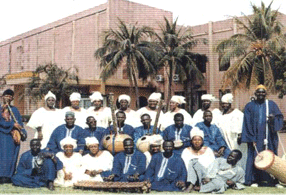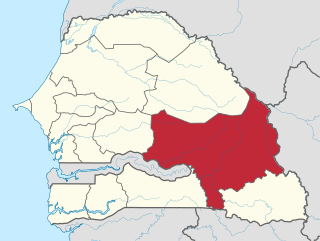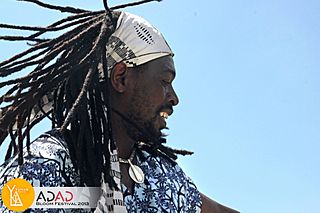Related Research Articles

A percussion instrument is a musical instrument that is sounded by being struck or scraped by a beater including attached or enclosed beaters or rattles struck, scraped or rubbed by hand or struck against another similar instrument. Excluding zoomusicological instruments and the human voice, the percussion family is believed to include the oldest musical instruments. In spite of being a very common term to designate instruments, and to relate them to their players, the percussionists, percussion is not a systematic classificatory category of instruments, as described by the scientific field of organology. It is shown below that percussion instruments may belong to the organological classes of idiophone, membranophone, aerophone and cordophone.

The music of Mali is, like that of most African nations, ethnically diverse, but one influence predominates: that of the ancient Mali Empire of the Mandinka. Mande people make up around 50% of Mali's population; other ethnic groups include the Fula (17%), Gur-speakers 12%, Songhai people (6%), Tuareg and Moors (10%).

A djembe or jembe is a rope-tuned skin-covered goblet drum played with bare hands, originally from West Africa. According to the Bambara people in Mali, the name of the djembe comes from the saying "Anke djé, anke bé" which translates to "everyone gather together in peace" and defines the drum's purpose. In the Bambara language, "djé" is the verb for "gather" and "bé" translates as "peace."

Tambacounda, formerly known as Sénégal Oriental, is a region of Senegal. It used to be part of the Mali Empire before the borders were created to separate Mali from Senegal. Tambacounda is physically the largest of Senegal's 14 regions, but is sparsely populated and its economy lags behind the rest of the country. The department of Kédougou was separated from Tambacounda in 2008, and became a separate region.

Guinea is a West African nation, composed of several ethnic groups. Among its most widely known musicians is Mory Kanté - 10 Cola Nuts saw major mainstream success in both Guinea and Mali while "Yeke Yeke", a single from Mory Kanté à Paris, was a European success in 1988.

Dunun is the generic name for a family of West African drums that have developed alongside the djembe in the Mande drum ensemble.

The music of West Africa has a significant history, and its varied sounds reflect the wide range of influences from the area's regions and historical periods.

Alpha Yaya Diallo is a Guinean-born Canadian guitarist, singer and songwriter. He incorporates Guinea's rich musical tradition into his original compositions. Diallo has won two Juno Awards, shared a third, and was nominated another three times.

Mamady Keïta was a drummer from the West African nation of Guinea. He specialized in the djembe. He was also the founder of the Tam Tam Mandingue school of drumming. He was a member of the Manding ethnic group.

Kouroussa is a prefecture located in the Kankan Region of Guinea. The capital is Kouroussa. The prefecture covers an area of 14,050 km.² and has a population of 268,630. With Kouroussa town by far the largest in the Prefecture numbering only 10,000, the vast majority of the Prefecture's population live in small rural communities, making their living from subsistence and small scale cash crop agriculture, as well as small scale trade and mining. The majority of the population are members of the Malinke ethnic group or related Mande speakers. The eastern portion of the prefecture is formed from the Niger River valley, while most of the area characterized by low rolling hills and dry savanna grasslands or scrub-like forest.

Kouroussa or Kurussa is a town located in northeastern Guinea, and is the capital of Kouroussa Prefecture. As of 2014 it had a population of 39,611 people. A trade center and river port from at least the time of the Mali Empire, Kouroussa has long relied upon its position near the upstream limit of navigation of the Niger River to make it an important crossroads for people and goods moving between the Guinea coast and the states of the western Soudan and Niger River valley. The town and surrounding area is a center of Malinke culture, and is known for its Djembe drumming tradition.

Ba Cissoko is a Guinean world music band featuring five members, two of whom play the traditional Kora harp. Two band members play percussion instruments and one plays bass. The sound of the band has been described as "West Africa meets Jimi Hendrix".

Abdoulaye Diakité was an influential djembe master drummer and teacher from Tambacounda, Senegal. He was the lead djembe player of the National Ballet of Senegal for 18 years before emigrating to the United States.

Famoudou Konaté is a Malinké master drummer from Guinea. Famoudou Konaté is a virtuoso of the djembe drum and its orchestra. One of only a handful of initiated masters of the Malinké drumming tradition, Famoudou is universally respected as one of the world's premiere djembe master drummers. He has dedicated his life to performing and preserving the music of his people, helping to elevate the djembe orchestra from its traditional roots to worldwide popularity.
Les Percussions de Guinée was founded in 1987 by the Ministry of Information, Culture, and Tourism of the Republic of Guinea with the meeting between seven nationals drummers and the French artist François Kokelaere. It is a government sponsored national ballet of the finest percussionists, musicians, and dancers from Guinea, West Africa.

Les Ballets Africains is the national dance company of Guinea and is based in Conakry. It is one of the first African national dance companies. It has toured extensively around the world. Although the French name might suggest the idea of European ballet to English speakers, the focus of the company is actually on promoting traditional African dance and culture.
Dramane Kone is a master drummer and griot from Burkina Faso. He is best known for his appearance in the Taali Laafi Rosselini documentary film Great Great Grandparents Music, which featured vignettes of Dramane Kone's griot family life in west Africa. He specializes in the goblet-shaped hand drum called djembe. He is a member of the Dioula ethnic group.

Grupo Yaramá is a group of musicians who base their work on the musical traditions of Senegal, Mali and Guinea in West Africa. They are often accompanied by dancers. Their work has been recorded in the documentary film On-Yaramá (2008), presented at the African Film Festival of Tarifa.

Ballet Nimba from Guinea is an African dance theatre company and music recording artist. It is the first of its kind to be based in Wales, UK. It was founded in 2010 by Guinean choreographer Idrissa Camara with its home in Cardiff and is made up of a collective of about 15 dancers and musicians.

Idrissa Camara is a dancer and choreographer originating from Guinea in West Africa. He has made the UK his home and is founder and director of Ballet Nimba, an african dance theatre Company which he founded in 2010. Idrissa is also a music recording artist having produced an album Sogay with his company's musicians and more recently he has turned his hand to film making producing the short documentary Fare Ta.
References
- ↑ Shepherd, Ed (17 July 2007). "All-Nations Cup returns to Starfire complex". SeaTac News. Retrieved 27 October 2012.
- 1 2 "About Manimou Camara". Dounia Djembe. Archived from the original on 20 May 2008. Retrieved 27 October 2012.
- ↑ "West African Dance". SHIFT Movement & Healing Arts. Archived from the original on 20 January 2012. Retrieved 27 October 2012.
- ↑ "Les Merveilles D'Afrique". National Geographic. Archived from the original on 29 July 2012. Retrieved 27 October 2012.